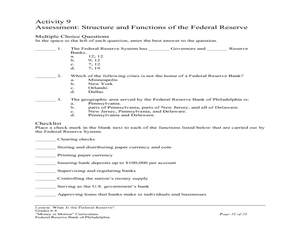PricewaterhouseCoopers
The Stock Market
Keep or sell? Young learners simulate as buyers in the stock market while learning about the benefits and important factors to know when purchasing. The thorough resource allows for observation of case studies and provides an assessment...
Curated OER
The Economy
Learners explore the role of government in the economy market. In this economics lesson plan, students analyze the decision making and how it takes into consideration additional cost, benefits and public awareness of what they are trying...
Curated OER
Going Shopping
Students investigate the value of money. In this money lesson plan, students simulate going shopping in their classrooms for various objects. Students use play money to pay for the objects.
Curated OER
Why People Trade
Young scholars explore the role of government in the economy market. In this economics instructional activity, students analyze the decision making and how it takes into consideration additional cost, benefits and public awareness of...
Curated OER
Curiosity Shop
First graders simulate shopping for needs and wants. In this money lesson, 1st graders examine Norman Rockwell's painting "Curiosity Shop." Students role-play shopping in a store and making purchases.
Curated OER
Put Your Truss in Building Bridges
Students apply abstract concepts, such as stress, fulcrums, the law of gravity, and the strength of different geometric shapes. Groups of student contractors operate simulated architectural firms to create strong, economical bridges.
Curated OER
Payment Parliament
Students investigate how the economy works by role playing in their class. In this money management activity, students read parts from a script for use in a role playing activity simulating the Federal Reserve and their payment...
Curated OER
What Is the Federal Reserve?
Students examine simple bank transactions. For this banking lesson, students analyze banking transactions such as deposits, loans, and how they hold reserves. They participate in simulations of the process of clearing a check and the...
Curated OER
Emissions Trading
Students produce manufactured good, barter for sales, encounter government officials, make choices about emissions, trade carbon credits and share findings in order to understand how carbon trading could affect industry from an economic...
Curated OER
Economics and emissions
Eighth graders produce a manufactured good and monitor energy consumption. In this Math lesson, 8th graders practice their basic math and accounting skills. Students participate in a business simulation.
Visa
Allowances and Spending Plans
Help youngsters understand how to manage small amounts of money by discussing an allowance and the difference between spending, saving, and giving.
Curated OER
Atlatl Lesson Grades 4-12
Tenth graders explore the weapons of the Aboriginal people. In this tenth grade mathematics instructional activity, 10th graders investigate how throwing with an atlatl increase the speed of the dart as it is thrown. Students calculate...
Curated OER
Saving Strawberry Farm
Students explore U.S. History by analyzing the Great Depression. In this economic instability lesson, students read fictitious accounts of a farm dealing with the loss of a Strawberry Farm and discuss the reasons behind the loss....
Curated OER
Algebra: Do You See What I See?
Young scholars discover how to find the mean, median, and mode from sets of data. By using statistical techniques such as whisker plots and bar graphs, they display the data gleaned from problems. Individually, students complete...















